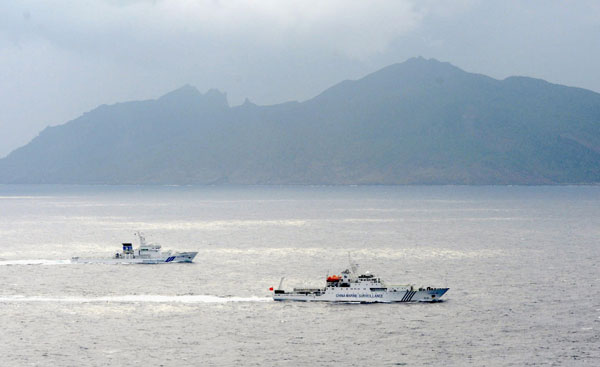
In this April 23, 2013 file photo, a Japan Coast Guard vessel, left, sails along with a Chinese surveillance ship near the disputed islands called Senkaku in Japan and Diaoyu in China in the East China Sea. Japan and China, along with South Korea, set aside historical and territorial animosities to hold a trade summit. AP
SEOUL, South Korea — The leaders of South Korea, China and Japan held their first summit in more than three years Sunday, setting aside historical animosities and territorial disputes to focus on shared security and trade concerns.
No substantive breakthroughs were expected, but the meeting in Seoul was a symbolic statement of intent by Northeast Asia’s three largest economies who all stand to reap significant diplomatic and economic gains from closer cooperation.
The focus was very much on economic ties, with China especially keen to boost trade links as it seeks to inject some fresh momentum into its slowing economy.
Also high on the agenda was North Korea whose nuclear weapons ambitions pose a worry — and threat — to all three countries, including China, which is the North’s main diplomatic protector and economic benefactor.
The triumph of realpolitik will be capped Monday by a first ever one-on-one summit between South Korean President Park Geun-Hye and Japanese Prime Minister Shinzo Abe after an extended diplomatic freeze.
Soured ties with Japan
It was the souring of Japan’s relations with its two neighbors that triggered a lengthy hiatus in the annual trilateral summit mechanism after the last meeting in 2012.
Sunday’s gathering actually fell slightly below the full summit level, with China represented by Premier Li Keqiang, rather than President Xi Jinping.
Observers say Li’s comparatively technocratic style made it easier to keep the focus on economic cooperation and away from the sensitive issues that have dogged relations for decades.
Relations between Seoul and Tokyo have never been easy — clouded by sensitive historical disputes related to Japan’s 1910-45 colonial rule over the Korean peninsula, especially the issue of Korean “comfort women” forcibly recruited to work in Japanese wartime military brothels.
Park, who took office in early 2013, had until now repeatedly refused to meet Abe, saying Japan had yet to properly atone for its past actions.
China has similarly bitter memories of Japanese wartime aggressions and is also at odds with Tokyo over sovereignty of an island chain in the East China Sea.
‘A lot of baggage’
“There’s a lot of baggage, but all three countries acknowledge it’s time to set that down for a while,” said Kim Soung-Chul, an international policy expert at the Sejong Institute think-tank in Seoul.
“There are just too many common issues that need comprehensive discussion, and they are all under pressure at home and abroad to get this dialogue going again,” Kim said.
Observers will be watching for any progress in efforts to seal a trilateral free-trade agreement that would provide a counterpoint to the new US-led Pacific trade pact of which China and South Korea are not members.
In their one-on-one talks on Saturday, Park and Li agreed to push for the earliest possible ratification of a bilateral free trade deal, which has yet to be approved by the South Korean parliament.
The big sit down comes on Monday with the South Korean president’s first summit with Abe.
Before flying to Seoul on Sunday morning, Abe said he expected a “frank exchange” of views at the trilateral and added that he wanted Monday’s meeting with Park to be “meaningful”.
Their talks were only confirmed days before amid reports of behind-the-scenes bickering over how Japan’s wartime sex slavery might be addressed.
“The summit is a big step forward for both countries,” said Hideshi Takesada, a professor at Takushoku University in Tokyo.
“The South Korean side has pinned its hopes on a Japanese compromise over history and the so-called comfort women issue, but it is unlikely to be resolved during the summit.
“At best, the two sides would agree to continue their dialogue over the issue,” Takesada said.

